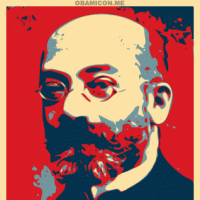Missatges: 60
Llengua: English
Miland (Mostra el perfil) 14 de juny de 2008 17.17.25
http://www.hunterarchive.com/files/Poetry/Elegies/...
My interpretation of this particular passage is that it is hard for humans in the mind at once to hold at once the potential greatness of a child as a human, and once who is ordained to death - the 'gray bread' may refer to the colour of the corpse the infant is destined to become. I justify my interpretation by the context - here's the last part of the 4th elegy that follows the passage:
?.....Murderers
are easy enough to understand.
But to hold death,
the whole of death,
even before life is fairly begun-
to contain it gently
and without complaint-
that defies understanding.
Ganavion (Mostra el perfil) 15 de juny de 2008 0.46.21
Ferdinand Cesarano:Cesarano is in the province of SalernoGanavion:OK, now we are touching on some important issues! Where is this town? My grandfather, Palmerino Cesarano, was born in Napoli in 1892.
ps
There's a town called Cesarano near where I live.
48 km from Napoli
15 km from Amalfi
If you start from Napoli, you take the motorway Napoli-Salerno
Exit at Angri
Go on in direction of "Costiera amalfitana", and pass the "valico di Chiunzi" (Chiunzi pass)
Continue in direction of Ravello and you find it (you don't need to arrive to Ravello).
It's in a green valley, where they produce wine, goat cheese and so on.
A few km further you have the splendid costiera amalfitana, with sun, warm sea, good food, the best lemons in the world, wonderful sights, and (I'm sorry) too much traffic.
Bye for now
Rian (Mostra el perfil) 15 de juny de 2008 12.40.26
Ganavion (Mostra el perfil) 16 de juny de 2008 8.53.34
Rian:I don' t think English needs a spelling reform. For me English is not difficult because of its spelling. At the opposite, I would find it even more complicated to learn after changing its familiar look. Moreover its word stems would change dramatically and be not recognizable any more in view of their origins. I think, that would be a serious matter, as the most time of learning a language has to be invested in studying its vocabulary. The look of English words is very nice, and the learning of its pronunciation is just a matter of feeling at the very beginning of learning that language - so why destroy it?I think you centered the question.
I totally agree with you.
Senlando (Mostra el perfil) 18 de juny de 2008 4.39.08
http://www.taipeitimes.com/News/editorials/archive...
i would like to add though, even though English takes a long time to memories in order to learn how to spell, it could be a lot worse, for instance Chinese is a lot harder to master since you would have to memorize every character. at least in English we have some phonetics, i just think that a phonetic language should be easier to learn!
Frakseno (Mostra el perfil) 18 de juny de 2008 16.47.31
Senlando:as i was reading my daily newspaper i came across this article on the spelling problem that i thought was interesting.I tend to agree that the spelling of English is illogical and often unpredictable, but I'd hardly hold up the words asparagus, spinach, caterpillar, dwarf, banana, petal and telescope as exemplars of this problem.
http://www.taipeitimes.com/News/editorials/archive...
Ergazomai (Mostra el perfil) 27 de juny de 2008 16.45.10
Tro da guturaj vokaloj, kaj vortoj tre konfuzaj! (I'll better say it in Esperanto).
In my English encyclopedia, I saw that, for the English pronounciation, "Interlingua" should be read "eenterLEEngwaah". Horrible! English should not be changed. It should only be purified!

erinja (Mostra el perfil) 27 de juny de 2008 17.11.47
"Sand dune" would come up looking pretty horrible if you transliterated it into a language like Hungarian. (something like "szëngyún"). Yet Hungarian has a fairly phonetic system of spelling, once you know the rules.
mnlg (Mostra el perfil) 27 de juny de 2008 17.49.50
 .
. erinja (Mostra el perfil) 27 de juny de 2008 18.41.32
http://en.wikipedia.org/wiki/Hungarian_alphabet
"ë" is a sound found in some dialects of Hungarian, and this letter is used when writing down those sounds, since no combination to represent that sound is found in the standard Hungarian alphabet.
Also, I agree that beauty and horror are in the eye of the observer. My only point was that in many cases, a transliterated version of a word will often look mangled. Presumably the previous writer didn't like the many "ee"'s written in the transliteration of "Interlingua", but presumably speakers of languages where "ee" is a common combination would have no problem with it at all.






